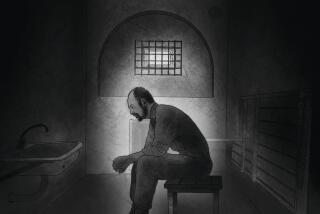Nightmare of War Never Ceases for This Former Civilian Prisoner
- Share via
CLIFTON, N.J. — Frank Martyn still cannot sleep with the lights turned off. The darkness reminds him too much of solitary confinement.
He does not sleep with his wife, Julia, because he cannot “stand to be touched” when he’s experiencing a nightmare about the six years he suffered as an American civilian prisoner of war more than 40 years ago, first at the hands of the Russians and then the Germans.
He was one of 18 American civilians taken prisoner in Poland and later was one of about 2,400 Americans help captive by the Germans.
“I still can’t control a nightmare. It sneaks up on me, and everything becomes real again,” Martyn said in a recent interview.
‘I Still Get Cold Sweats’
“And I didn’t want to talk about it until now. I still get cold sweats. . . . It bothers the hell out of me,” he said.
Martyn, who will attend the first former civilian POW conference in Fullerton today, was 18 when he was taken prisoner by the Russians after they invaded eastern Poland in 1939. He had traveled to Stanislow with his parents to visit his ailing grandmother. His father had returned to their Brooklyn home in August, 1939, and Martyn had stayed in Poland with his mother.
After the Russian invasion on Sept. 17, 1939, Martyn was forced to report to a military headquarters each day. He said he had to walk six miles every morning to answer questions about why he was distributing anti-Russian propaganda. Martyn denied the accusation.
The routine continued for about three months until the Russians decided to hold him prisoner. They took away his American documents and gave him Russian papers.
Daily Beatings, Torture
“The whole time I kept telling them I was American-born,” Martyn said, sitting in an armchair in the small living room of his two-story row house near the downtown area of this city.
The Russians kept him for almost 18 months. Martyn said he was beaten and tortured almost daily. Much of the time he was in solitary confinement. He still has nightmares of the water torture.
“It was always so dark and quiet. . . . Then you’d hear it: ping, ping, ping, ping. . . ,” he said, his voice barely above a whisper.
“They were working to mentally and physically destroy me. I got beaten almost every day, but I’d always remind them that I was an American.”
Martyn, now 64, gained freedom from the Russians in early 1941 when the Germans came. He was able to return to his mother and grandmother. He was frail and undernourished.
Never Saw Mother Again
As he regained his strength, Martyn started attending church. But one day as he left Mass, Gestapo agents snatched him and again freedom was gone; this time for more than four years.
He never saw his mother or grandmother again.
“I never even found out what happened to my mother,” he said in a thick Brooklyn accent.
During his four years of internment in Germany, Martyn was moved from one concentration camp to another. He rarely spoke to anyone, spending most of his time in solitary confinement when he was not working on chain gangs.
But even while working with other prisoners, he was not permitted to talk.
“The Germans were no better than the Russians. Every day they fed me a slice of bread and a quart of soup made straight from the garbage. I never talked to anybody. To my knowledge, I never even saw another American.
‘They Will Not Beat Me’
“I was always alone and I wasn’t sure of anything. But I always wanted to live. I told myself constantly: ‘I will make it. They will not beat me.’ ”
In March, 1945, he was rescued by U.S. Army troops and taken to Berlin.
Martyn still doesn’t know the location of the camps where he was kept.
“I didn’t care about that. I was just glad to be free,” he said.
In Berlin, Martyn worked for nearly two years in a military motor pool while U.S. officials investigated his case. He had no documents to prove he was an American. A faded photograph shows him as a gaunt, unsmiling soldier in an Army uniform.
“But they finally realized that my Brooklyn accent was too real for me not be an American,” he said.
Scarred and Tormented
Eight years after departing for Poland as a curious youth, Martyn returned to Brooklyn as a 26-year-old man scarred and tormented by the horrible experiences of torture and solitary confinement.
The first five years back were especially rough for Martyn. He said he lost jobs because he took days to recover from the nightmares and his employers were unsympathetic about his condition.
In 1952, he met Julia, who shared his Ukrainian heritage, at a dance in Clifton. They were married two years later and Martyn freely admits that “if it weren’t for my wife, I wouldn’t be living today.”
Today, Frank Martyn is more at peace with himself. He drives his car or strolls around the neighborhood with the use of a cane. Four years ago, he was hit by a motorcycle and suffered a leg injury that forced him to retire from his maintenance job with the county.
But the relative peace of mind he has finally achieved has not been enough to prevent the occasional nightmares because “you can’t ever be the same again. War is hell and it does terrible, terrible things to you.”
More to Read
Sign up for Essential California
The most important California stories and recommendations in your inbox every morning.
You may occasionally receive promotional content from the Los Angeles Times.













